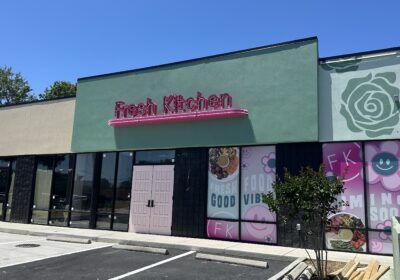Student detects cancer mutation trend

While many scientific discoveries happen after years of research, some breakthroughs can happen when least expected.
USF graduate student Michele Parry noticed a trend that even her professors missed. Cancer mutations happen more frequently in larger genes than smaller genes. This finding merited a published paper with her name listed first — a rare feat for a master’s student.
Parry was volunteering in a lab with the USF Health Morsani College of Medicine late last year when she realized a possible trend in determining why certain genes of cancer cells mutate and others don’t.
To help boost her resume, Parry began working with professor George Blanck who teaches molecular medicine for the college. Blanck studied how the varying size of genes correlates to their potential to develop cancer or other mutations.
Parry was assigned to review data screens from previously collected cases. The tedious process lasted several months, but Parry noticed the trend that larger genes are more prone to mutation than smaller ones, specifically those genes that encode cytoskeletal proteins, which are considered the framework of cells.
“Everybody was set on the idea that cancer chooses what genes to mutate,” Parry said. “However I was saying it’s more of a random process based on the size of the gene. Cytoskeletal genes are very large in relation to others, so they’re more likely to be targeted.”
After reflecting on her findings, Parry presented her hypothesis to Blanck who wasn’t immediately on board with the idea.
“He had his mind set on proving a specific hypothesis he had formed before I was a part of the lab,” Parry said. “At first he didn’t think my finding was important, but after doing more research and attending a conference that made a similar claim, he immediately told me to get back to work on my idea.”
Seeing that this “ah-ha” moment could have serious scientific implications, Blanck and Parry worked to complete a publication of the findings and listed Parry as the first author. Even though it is uncommon to list students first in published research, Blanck said this experience called for nothing less.
“Her discovery tied a lot of things together with how mutations occur in the cytoskeletal proteins,” Blanck said. “Cancer cells have strange shapes which could be reflective of why they’re cancerous or metastasized.”
Blanck said experiencing student success like Parry’s only inspires him to continue research and promote student involvement.
“It’s very rewarding,” he said. “It propagates the work so you feel like you’re sparking an interest and watching them turn that into something you might have never thought of. It just really amplifies my work and makes me feel that I’m having an impact on students like Michele.”
Parry said she had never met anyone who had cancer before working in Blanck’s lab. But in December, Parry received news no one ever wants to hear — her mom had been diagnosed with a serious cancer of her own.
“The timing was very ironic,” Parry said. “I was working on something that could one day lead to a possible cure, and then I get told my mom has cancer.”
Although this news came as a surprise, Parry continues to research with Blanck as a paid graduate assistant. She said her mom’s diagnosis made her realize just how huge of an impact cancer can have on the lives of others.
“It kind of opened my eyes to the fact that no matter your ethnicity, your income or your age, cancer can get you,” Parry said. “It really motivates me to continue doing research and working toward a cure.”
Parry was recently accepted to the FIU Herbert Wertheim College of Medicine in Miami and will start in the fall. She has already received her bachelor’s and master’s degrees from USF and has also worked as an adjunct professor at St. Petersburg College.
The culmination of her work with Blanck paired with the timeliness of her mom’s diagnosis has only reaffirmed Parry’s passion for the medical field. She recently decided that she wants her focus to be specifically in oncology moving forward.
“Before my mom’s diagnosis I knew I wanted to pursue becoming a medical doctor, but I was not exactly sure if I wanted to work oncology,” Parry said. “When she told me about her cancer, it was the icing on the cake to make me realize what I wanted to do in life.”
With a brighter future ahead, Parry said she wants to focus on continuing research in the lab before heading off to medical school. She said if she’s learned anything over the last few months, it is the importance of simply being there for those going through cancer.
“You feel kind of helpless, like there’s nothing you can do,” she said. “No matter who it is, if you love them, spend as much time with them as possible. Be their support system because the cancer is going to continue and a lot of treatments aren’t exactly positive, so having others there throughout their journey is crucial.”






